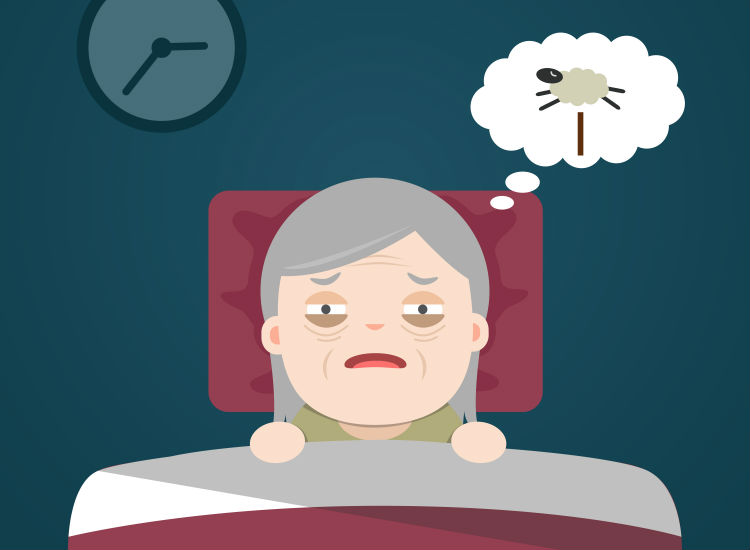Sleep is one of the most basic human needs, and for most people, there is nothing that rejuvenates the body and mind more than grabbing a little shut-eye. However, for the more than 2.3 million people affected by multiple sclerosis worldwide, each night can be more of a struggle than a retreat. Multiple sclerosis (MS) is a chronic, unpredictable disease of the central nervous system that not only causes difficulty sleeping, but also includes extreme fatigue as one of its many symptoms.
Over 50 percent of people with MS experience some form of sleep disturbance, which can lead to daytime drowsiness, lack of mental clarity, unstable emotions and a weakened immune system. It is important to understand the possible causes of sleep deprivation for those suffering with MS, as this knowledge can provide potential treatment and management options.
Types of Insomnia
Generally, insomnia refers to difficulty falling or staying asleep, but there are three basic types that MS patients experience: initial, middle and terminal. Initial insomnia occurs when someone has difficulty falling asleep. This can be caused by pain, anxiety and some medications. Middle insomnia involves waking up during the night and having a difficult time falling back asleep. This type is typically caused by pain, muscle spasms and trips to the bathroom during the night. Terminal insomnia happens when a patient wakes up too early and may be caused by a lack of exposure to daylight that interferes normal sleep cycles. Below we will explore a few of these causes and some solutions that can help with them.
Nocturia
One of the most frequent causes of sleep interruption for MS patients is nocturia, or the need to repeatedly urinate throughout the night. Bladder and bowel issues are not uncommon for people with MS, and difficulties can arise when someone's sleep is interrupted many times during the night. These disruptions interfere with naturally occurring restorative sleep cycles and can cause sleep deprivation. Possible solutions include limiting fluid intake a few hours before bedtime and avoiding foods and beverages that can aggravate an overactive bladder, such as caffeinated and alcoholic beverages.
Depression and Anxiety
Other possible causes of sleep deprivation could be depression and/or anxiety, which happen to be common side effects of MS. Mood disorders often lead to insomnia, resulting in restlessness rather than a restful night of sleep. If your loved one is struggling with these or other emotional problems, obtaining a referral to a mental health professional can help. Relaxation therapy, meditation, breathing exercises and even phototherapy can also be effective treatments for calming the mind and easing into sleep.
Spasticity and Sleep Positions
Yet another sleep disturbance has to do with spasticity, a common MS symptom that occurs when muscles become tight and rigid. It occurs most frequently in the legs, but can vary in location and severity. This uncomfortable and painful symptom can undoubtedly cause sleepless nights and is sometimes difficult to distinguish from restless leg syndrome or periodic limb movements in sleep.
Spasticity is also somewhat related to the simple concept of sleep position. Our bodies were not designed to sleep in one position throughout the night, and while most people are able to change position without even remembering waking up, some individuals affected by MS experience such severe pain and discomfort that contact with the bed makes sleep almost impossible. Changing positions can trigger muscle spasms and pain in and around joints.
The best ways to relieve spasticity include stretching, exercise, physical and occupational therapy, and medication. Some patients report that warm weather or increased body heat that occurs during exercise causes their symptoms to get worse, but activities such as swimming and water aerobics can help with this. Exercising in an air conditioned area can minimize discomfort as well. Remember, exercise can act as a stimulant, so engage in physical activities well before bedtime.
Temperature Dysregulation
For some reason, people with multiple sclerosis are especially sensitive to extreme temperatures. High heat and humidity and very cold temperatures can exacerbate symptoms such as spasticity. For some patients, overheating and night sweats are regular occurrences that can derail a good night’s sleep. To help your loved one cool down at night (but not too much), experiment with linens and pajamas that are still cozy, but not so heavy that they will cause them to overheat. Most people sleep best in a cool, dark room, but it can take some trial and error to figure out what the thermostat should be set to in order to maximize their comfort. Hormonal changes and certain medications can contribute to these symptoms as well, so be sure to bring up these concerns with your loved one’s doctor.
Sleep Apnea
An issue for those with and without MS, sleep apnea causes frequent pauses in breathing while one is sleeping, resulting in a reduction of oxygen flow to the brain. However, due to nerve spasms and damage to areas of the brain stem that manage involuntary functions, those affected by the disease are more likely to suffer from this particular sleeping difficulty. Lifestyle changes, such as losing weight or quitting smoking, CPAP machines, and oral devices can help keep a patient’s airways open and improve sleep quality.
Medications
At times, MS medications themselves can cause sleeping difficulties. It is important to discuss any concerns about side effects with a doctor, and under no circumstances should you introduce over-the-counter sleep aids without consulting with your family member’s physician. Most of these medications contain antihistamines, which are not recommended for older individuals or those who have a brain-related disability since they can cause confusion and memory problems. Alternative treatments, such as acupuncture, biofeedback, massage therapy, and other holistic or therapeutic practices, have been shown to help with relaxation and sleep, but it is always important to consult with a physician before exploring these alternative medicine options as well.
Naps
Since fatigue is a common symptom of MS, it only makes sense that napping would help a patient be more alert and productive throughout the day. Daytime sleeping can get excessive, though. It is important to encourage your loved one not to overdo it with napping, since this can interrupt their nighttime sleep patterns.
As you can see, MS patients face immense challenges when it comes to getting the rest that so many take for granted. The National Multiple Sclerosis Society provides a comprehensive list of commonly used pharmaceutical solutions that you might want to review with your loved one’s physician for sleep disorders and other MS symptoms and complications. For some patients, seeing a sleep specialist may be necessary to get to the root of their fatigue and sleep issues. Understanding the possible causes of sleep problems can help those with MS better manage their challenging symptoms and find their way to a restful night of ZZZs.

